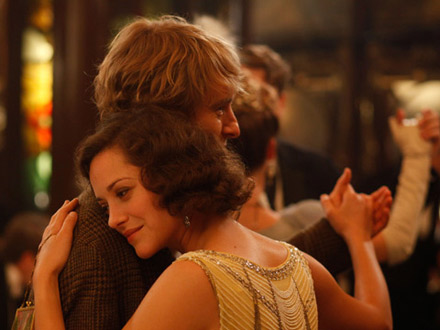There are times where I wonder what it’d be like to live in another time period. Sometimes it’s not just a general interest in the past, but more of a concrete period like the 40’s or 50’s.It’s no surprise that I’d feel this way because as humans we often see the past as being simpler than the time we currently reside in. I must say it’s easy to see how this happens considering that as time goes by, we often lose the context (or never gain at all) that is associated with a certain string of years or decades. Not to mention, history is almost always romanticized and fondly remembered outside the walls of a History lecture. This interest in returning to a simpler time, one that faces no uncertainties, is invariably running rampant through the mind of Gil Pender (Owen Wilson), the protagonist found in Woody Allen’s Midnight in Paris. Gil is a Hollywood screenwriter who has made his money writing big studio drivel, but at the moment he’s working on his first novel. It’s through novels that he hopes he can achieve writing legitimacy. Facing a bit of writer’s block and looking for something to reinvigorate his spirit, Gil and his fiancée, Inez (Rachel McAdams), tag along with their in-laws to Paris.
Wednesday, June 22, 2011
Tuesday, June 21, 2011
"The Hangover Part II" lacks originality (3.25/5)
The beauty of The Hangover was that its lewd and outrageous premise, one that had characters discovering their drunken follies along with the audience at an embarrassing clip, featured a level of joyous revelation that made punch lines unpredictable and memorable. The surprising directions that The Hangover took were inevitably the reason why the film became a hit back in the Summer of 2009. To no one’s surprise, the sequel was nearly a guarantee in a film landscape that spits out second installments at an impressive rate. Was a sequel necessary? Not really, but then again the film was fresh and hilarious enough that a sequel wouldn’t be objected by the masses, and certainly not from me. Unfortunately, the creative team behind The Hangover felt that the film’s original premise was good enough to be recycled. They were wrong.
Friday, June 10, 2011
"Super 8" is tender, exhilarating, and perfect (5/5)
Tenderness is what makes Steven Spielberg’s earlier films so venerable. Whether it’s the films he’s directed (i.e. E.T.) or films he’s produced (The Goonies), Spielberg has undeniably been attached to terrific stories that are able to earn their emotional vouchers from filmgoers. By having a keen sense of emotion and childhood nostalgia, it’s easy to see why many people hold Spielberg in such a high regard. If there was ever a prime example of a filmmaker emulating the master known as Spielberg, it would be JJ Abrams. Not counting Mission Impossible III, Abrams has slowly built up a filmography (and even his foray into television) that deftly blends summer action with a heart that resonates with critics and audiences alike. Whether it’s his watchful eye as producer over the likes of Lost and Cloverfield, or his sharp directorial vision behind Star Trek, Abrams is a man who understands how to tell a story. And what a story he tells with his latest endeavor Super 8.
Tuesday, June 7, 2011
"On Stranger Tides" is better than its predecessors (3.5/5)
What is there to say about the Pirates of the Caribbean film franchise? Well, the first film is a terrific pop-corn flick that combines technical achievements with an infectious Johnny Depp performance. The sequels are commercially overrated. The second film is merely a bridge to developing a money hungry franchise bigger than the Kraken, and the third film is an overstuffed adventure that has a plot that becomes too convoluted with its own pirate lore. Needless to say, the Pirate sequels were studio excess gone awry. Certainly the Pirates franchise had a pulse in regards to special effects mastery, but it had been drifting off to sea after the first film, with no sense of land or an editor within reach.
Subscribe to:
Comments (Atom)



